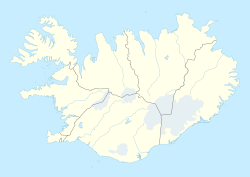Hekla 3 eruption facts for kids
Quick facts for kids Hekla 3 eruption |
|
|---|---|
| Volcano | Hekla |
| Date | c. 1000 BC |
| Type | Plinian |
| Location | Iceland 63°59′N 19°42′W / 63.983°N 19.700°W |
| VEI | 5 |
| Impact | Caused worldwide temperatures to drop for 18 years |
|
Hekla on the map of Iceland
|
|
The Hekla 3 eruption (H-3) happened around 1000 BC. It was the most powerful eruption of the Hekla volcano in Iceland during the last 11,700 years. This period is known as the Holocene. The eruption blasted about 7.3 cubic kilometers of volcanic rock into the air. Scientists measure the power of eruptions using the Volcanic Explosivity Index (VEI). The H-3 eruption had a VEI of 5, which is very strong. This huge eruption caused a "volcanic winter". This means temperatures in the northern part of the world dropped for several years afterward.
Contents
What Was the Impact of Hekla 3?
The Hekla 3 eruption caused a long period of global cooling. This cooling lasted for about eighteen years. Scientists found records of this cooling in Irish bog oaks. These are ancient trees preserved in bogs. The eruption's effects can also be seen in Greenland ice cores. Ice cores are long tubes of ice drilled from glaciers. They show layers of snow and ice from thousands of years. The eruption also left its mark in the growth rings of bristlecone pine trees. These trees showed extremely narrow growth rings during that time. This means they grew very little due to the cold weather.
How Do Scientists Date the Eruption?
Scientists use different methods to figure out when the Hekla 3 eruption happened. This is called "dating" the eruption.
Early Dating Ideas
Andy Baker's research team dated the eruption to 1021 BC, plus or minus 130 years. They looked at the growth of stalagmites. Stalagmites are rock formations that grow up from cave floors. In northwest Scotland, a stalagmite showed a sudden increase in growth for four years. This growth spurt was dated to 1135 BC, plus or minus 130 years. Baker's team thought this might be linked to the Hekla 3 eruption.
Later Dating Theories
Another scientist, Andrew Dugmore, had a different idea. He suggested the eruption happened around 929 BC, plus or minus 34 years. This is called a "low-chronology" interpretation. In 1999, Dugmore suggested that the changes seen in Scotland might not be from a volcano.
Some experts who study ancient Egypt, called Egyptologists, have a different date. They believe the eruption happened in 1159 BC. They think it caused famines during the time of Ramesses III. This was part of a bigger event called the Bronze Age collapse. However, Dugmore disagreed with this date. He used calculations about soil movement to suggest a date closer to 900 BC.
Another geologist, John Grattan, studied tree rings from bog oaks. His work supported the idea of a colder period. He found shrinking tree rings and disappearing tree species during this time. Other scientists prefer to use a more general date. They often say the eruption happened "3000 BP," which means 3000 years Before Present. This avoids the debate about the exact year.
See also
- Geography of Iceland
- Iceland plume
- Iceland hotspot
- List of volcanoes in Iceland
- Volcanism of Iceland
 | Sharif Bey |
 | Hale Woodruff |
 | Richmond Barthé |
 | Purvis Young |


